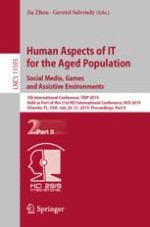2019 | OriginalPaper | Chapter
The Golden Age of Silver Workers?
The Role of Age in the Perception of Increasing Digital Work Environments
Authors : Johanna Kluge, Julian Hildebrandt, Martina Ziefle
Published in: Human Aspects of IT for the Aged Population. Social Media, Games and Assistive Environments
Publisher: Springer International Publishing
Activate our intelligent search to find suitable subject content or patents.
Select sections of text to find matching patents with Artificial Intelligence. powered by
Select sections of text to find additional relevant content using AI-assisted search. powered by
